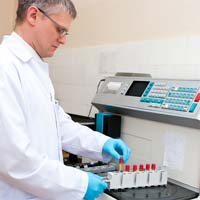New Biomarker May Help Diagnose Mesothelioma

Scientists in Japan believe that a protein found in the blood serum of rheumatoid arthritis patients may help doctors diagnose malignant pleural mesothelioma earlier.
Every year in the U.S., as many as 3,000 people are diagnosed with mesothelioma, a fast-growing asbestos-linked cancer that often causes few symptoms until in its later stages, when treatment options may be limited. Because earlier detection can increase the odds of survival, researchers around the world are searching for methods to detect mesothelioma sooner. Much of that research has centered on substances, known as biomarkers, that are overproduced by tumor cells and can be detected in blood serum.
The latest biomarker found to be elevated in mesothelioma cells is serum thioredoxin-1 (TRX), a biomarker for rheumatoid arthritis. The Japanese research team found that serum levels of TRX were higher in mesothelioma patients than in the general population. TRX was also higher in patients with advanced stage mesothelioma than it was in patients with early stage disease. The study’s authors say the difference in survival between patients with lower and higher serum TRX was significant, making TRX potentially useful not only for diagnosis but also for predicting outcomes.
The biomarker now used most often to detect mesothelioma is soluble mesothelin-related peptide (SMRP), a compound found in both the serum and lung fluid of mesothelioma patients. The FDA-approved Mesomark test for SMRP is now being used in combination with other diagnostic techniques to detect mesothelioma in symptomatic patients with a history of asbestos exposure. Although it is the most effective serum test available, Mesomark is not especially sensitive to early-stage mesothelioma or to types other than the epithelioid variety.
The same researchers who have suggested TRX as a mesothelioma biomarker, have also published studies on several other potential biomarkers for the disease. Angiopoietin-1 (Ang), a protein associated with pulmonary fibrosis, has been found to be ‘significantly higher’ in the blood serum of mesothelioma patients, especially those in the later stages of the disease. In another study, vascular endothelial growth factor (VEGF), a substance that regulates cell growth and division, has also been found in higher amounts in malignant mesothelioma patients, making it a potentially useful prognostic indicator.
These new biomarkers may help doctors diagnose mesothelioma earlier and an earlier diagnosis often means that treatment is more effective.
Sources:
Tabata, C et al, “Is serum thioredoxin-1 a useful clinical marker for malignant pleural mesothelioma?”, March 7, 2010, Antioxidants and Redox Signaling.
Yasumitsu, A et al, “Clinical significance of serum vascular endothelial growth factor in malignant pleural mesothelioma”, April 5, 2010, Journal of Thoracic Oncology, pp. 479-83.
Tabata, C et al, “A novel clinical role of angiopoietin-1 in malignant pleural mesothelioma”, November 2010, European Respiratory Journal, pp. 1099-105.
Mesomark – H060004, Recently Approved Medical Devices, FDA Website, Accessed March 7, 2011.





